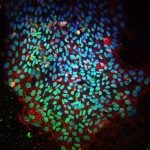Link to Pubmed [PMID] – 27327535
Link to DOI – 10.1111/pcmr.12502
Pigment Cell Melanoma Res 2016 Sep; 29(5): 550-8
Solar lentigines are a common feature of sun-induced skin ageing. Little is known, however, about the genetic factors contributing to their development. In this genome-wide association study, we aimed to identify genetic loci associated with solar lentigines on the face in 502 middle-aged French women. Nine SNPs, gathered in two independent blocks on chromosome 6, exhibited a false discovery rate below 25% when looking for associations with the facial lentigine score. The first block, in the 6p22 region, corresponded to intergenic SNPs and also exhibited a significant association with forehead lentigines (P = 1.37 × 10(-8) ). The second block, within the 6p21 HLA region, was associated with decreased HLA-C expression according to several eQTL databases. Interestingly, these SNPs were also in high linkage disequilibrium with the HLA-C*0701 allele (r(2) = 0.95). We replicated an association recently found by GWAS in the IRF4 gene. Finally, a complementary study on 44 selected candidate SNPs revealed novel associations in the MITF gene. Overall, our results point to several mechanisms involved in the severity of facial lentigines, including HLA/immunity and the melanogenesis pathway.


